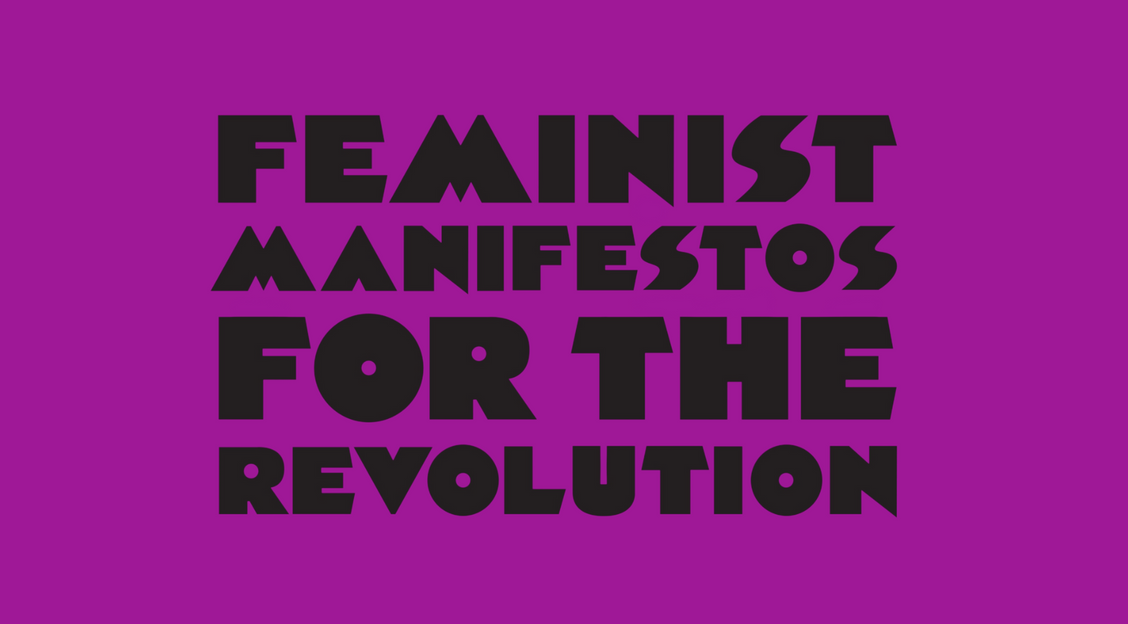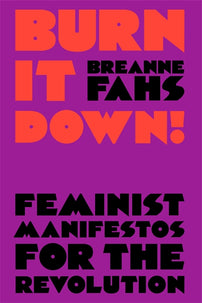Let’s Burn It Down | The Feminism of Againstness
How can we imagine a place for a new vision of feminism that poses itself as oppositional and defiant, with againstness as its key goal?

Until recently, almost nothing had been written about feminist manifestos at all. Perhaps the feminist manifesto poses a set of questions to us as readers: How can we imagine a place for a new vision of feminism that poses itself as oppositional and defiant, with againstness as its key goal? To imagine the essential role of feminist manifestos is to situate an angry, manic, authority-grabbing, insubordinate voice at the center of feminism rather than at its margins. A feminism of againstness values complaint, rage, tension, new forms of solidarity, and radical social change.
This reconfiguration also allows us to better consider the very painful ways in which feminist writing and thinking is often dismissed as trivial, overly emotional, and unsophisticated. I argue that we need a feminism full of outbursts and ill-temper, full of “Pussy Grabs Back” and fire in its belly.
We need a feminism of againstness, for which the manifesto perfectly fits the bill. As Caws writes, “The manifesto generally proclaims what it wants to oppose, to leave, to defend, to change. Its oppositional tone is constructed of againstness and generally in a spirit of a one time only moment.” The feminist manifesto invests itself with authority; “the manifesto stands alone, does not need to lean on anything else, demands no other text than itself. Its rules are self-contained, included in its own body.”
At its best, the feminist manifesto is not only a weapon against patriarchy but a weapon against the worst aspects of feminist politics—it refutes liberal tendencies of moderation and incremental, slow, “wait and be patient” modes of reform. It is a rebuttal to institutional practices of silencing women’s voices, and it refuses to ignore anger. It rips down the principles that underlie institutional politeness, women’s complicity in their own oppression, and authorial passivity. With renewed attention to the feminist manifesto as full of contradictions and new ways to find voice, the feminist manifesto could inform a feminist politics we can take pride in, one that is rambunctious, impolite, uncompromising, unapologetic, brave, and loud-mouthed.
Many feminist manifestos and their authors have been criticized for attempting to be any of these things and have consequently been discarded as mad, shocking, outrageous, difficult, hateful, and man-hating. Feminist writers have been trashed for criticizing the contemporary patterns of feminist politics that have “rebranded into banality” the goals of feminism.
Any efforts to argue against a “feminism is for everybody” lens have typically been swiftly squashed. Feminists constantly deride and degrade each other’s work, even as they are derided and degraded by anti-feminist forces with even more vitriol. The growing piles of hate mail and internet trolling of radical feminist writings—particularly manifestos—reveals something of the threat that this work poses to the status quo. Feminist manifestos do not hide behind rarified and obscure language; they pulsate with reality, breaking things.
I like to imagine feminist manifestos most basically as a genre of class-based rage, a fight against the ruling class, against unbridled wealth, against the policing of language and text, against the practices that exclude certain kinds of voices and certain kinds of thinking under the guise of respectability and politeness.
Manifestos allow for a real politics of the gutter to emerge—from, as Valerie Solanas writes, “the garbage pail that men have made of the world”—where a trashy, scrappy, fed up, angry vision of tomorrow emerges. As Solanas argues, we need a “fuck-up force.” After all, the feminist manifesto represents a taking of ruling-class, masculinized, and patriarchal power, a usurping of authoritative speech typically ascribed only to wealthy and powerful men.
The feminist manifesto is impolite by nature, refusing the very qualities— politeness and deference in particular—that women are socialized to cultivate in themselves; it is frankly impatient, unmotherly, irritated, revolutionary, nasty, ambitious, bossy, and at times violent—all of which constitute traditionally “unfeminine” qualities. (Whether this usurpation has its own hazards is an ongoing point of contention among feminist scholars.)
The feminist manifesto takes direct aim at the implicit goals of liberal feminism as necessarily welcoming, polite, and inclusive, instead advocating for a vision of feminism that is difficult, contentious and unruly. This kind of pushing back against moderate, incremental impulses of liberal feminism is crucial to the continued growth of feminism’s edges.
We must direct our energies to the wide range of targets for our oppression, to shamelessly operate as both individuals and a collective body, to welcome into the fold new and forgotten voices of feminist resistance, and to express righteous anger loudly and forcefully, even with the weight of the world on our shoulders. Let’s burn it down.
— An edited excerpt from Burn It Down!: Feminist Manifestos for the Revolution by Breanne Fahs
[book-strip index="1" style="buy"]
